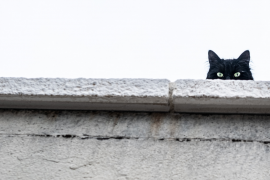One. Visibility. We can watch the entire movie, beginning to end, without having to hide behind a newspaper once. No over-the-edge cruelty is displayed, in other words—quite an unexpected gift from director Michael Haneke.
Two. Rhythm. Slow like slow cooking. Like the seasons, a plant growing or a liquor fermenting, a pie duly baked. Slow like things that take proper time to properly happen. It’s a movie about music. Although music isn’t the main theme of the film—not blatantly—it could not be more present, even just because of the CD player looming as a recurrent backdrop. Inherent musicality subtly woven, delicately interspersed within, makes the fabric of the movie. It expresses itself as a keen attention to rhythm, achieving an organic, perfect pulse. If you breathe with it, your lungs widen and your heartbeat stabilizes itself.
Three. Bourgeoisie. How can a movie about French upper class be actually bearable? How can we watch these characters for almost two hours and not hate them but resonate, even sympathize with them? The glance this film casts on a classy old couple is unusual. Everything occurs in the huis-clos of a pristine apartment, between grand piano and stained-glass windows, through the enfilade of useless salons, yet the décor doesn’t excessively taint the protagonists. They remain human in spite of their adherence to predictable, extenuating class rituals. Their exchanges are a distillate of good manners, duly practiced for decades, now totally embedded. Yet those gestures are no more performed for the sake of an audience. Due to the woman’s illness and decline, isolation squeezes the couple in its unforgiving embrace. Therefore, acts of courtesy and well behavior take a different meaning. They become rather good than manners, if it makes sense. Somehow we get a stripped version of bourgeois—intimate and devoid of parade. As we watch the daily life of the old couple unfold, morning to night, all ‘d’ adjectives come to mind. Discrete, with Bunuel. Decent. What does it mean? In this case, perhaps, dignified. What does dignified mean?
Four. Dignity. A key word, no doubt. The protagonists possess such quality at the highest degree. It’s the legacy the movie leaves with the viewer. Is it anything worth attention, or is it a ridiculous feature we should laugh at? It seems to mean integrity, and the need of treating a person as a person, no matter what. To remember a person is a person in all circumstances. To grant an individual—in all instances—rights to privacy and self-determination. Love comes down in this movie to the notion of respect. Is respect the same of ‘respectability’? Isn’t this last a quintessentially bourgeois concept? The movie articulates itself around this very question.
Five. Euthanasia. In the second decade of the twentieth century, it is still hard to treat this theme without tortuous wavering, ethical uncertainties, detours, vain regrets, guilt and so forth. Here none of such murky soup is churned. Dignity implies for an individual to be able to choose. Love implies for the lover to understand and respect the loved one’s choice. This crystalline assumption is developed without a faux-pas.
Six. Trintignant. Yes, Haneke wrote the role for him. He sent him the scenario to read before acceptation. That’s notoriously a winning way to cast actors. But how can an actor become just better and better? The slight fixity of his facial features, which could have been irritating in youth, has reached perfect ripeness. The limp, probably real, gives out with each step that the character takes an extra sense of purpose, a tangibility of effort, the resistance that ‘incarnates’ fiction, anchoring it within flesh and blood.
Seven. Bird. Nothing but a pigeon. Kind of vulgar. What does a pigeon do in such a neat apartment? It entered, we are told, form the courtyard. Twice, it broke in, like the thieves who attempted to force the locks at the very beginning or those who tried smothering Georges/Trintignant in his nightmare. What is breaking in, truly? Death, we understand. And what does it do? Philosophically, as well as by common wisdom, death levels. It makes us all equal. It vulgarizes. In this case, humanizes. As the pigeon breaks in, the protagonists are finally able to break out. The huis-clos bursts open.
Eight. Contour. If you love painters of interiors, from Vermeer to Hammershoi, you’ll enjoy each take. Haneke marvelously understand doors, closed, open, half closed, half open, and the way they frame the beyond.
TOTI O’BRIEN is the Italian Accordionist with the Irish Last Name. She was born in Rome then moved to Los Angeles, where she makes a living as a self-employed artist, performing musician and professional dancer. Her work has most recently appeared in Good Works, ZiN Daily, the Harbor Review, and Door Is A Jar.
Like what you’re reading?
Get new stories or poetry sent to your inbox. Drop your email below to start >>>
OR grab a print issue
Stories, poems and essays in a beautifully designed magazine you can hold in your hands.
GO TO ISSUESNEW book release
Ghost Engine by Christian TeBordo. Publisher’s Weekly says, “This serrated collection excels at knocking readers off-balance.” Order Ghost Engine by Christian TeBordo now.
GET THE BOOK



